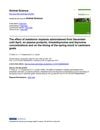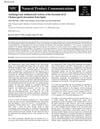 7 citations,
April 2014 in “Cell biology international”
7 citations,
April 2014 in “Cell biology international” Melatonin treatment helps improve skin health in postmenopausal rats.
 98 citations,
February 2007 in “Seminars in Cell & Developmental Biology”
98 citations,
February 2007 in “Seminars in Cell & Developmental Biology” Androgens can both stimulate and cause hair loss, and understanding their effects is key to treating hair disorders.
[object Object]  10 citations,
January 2009 in “Elsevier eBooks”
10 citations,
January 2009 in “Elsevier eBooks” Hair growth is influenced by hormones and goes through different phases; androgens can both promote and inhibit hair growth depending on the body area.
 113 citations,
March 2018 in “Biological reviews/Biological reviews of the Cambridge Philosophical Society”
113 citations,
March 2018 in “Biological reviews/Biological reviews of the Cambridge Philosophical Society” Animals that change color with the seasons mainly do so in response to daylight changes, but climate change is causing camouflage problems that may require evolutionary changes.
 31 citations,
January 2011 in “Dermato-endocrinology”
31 citations,
January 2011 in “Dermato-endocrinology” Melatonin protects skin against UV damage by regulating various cellular processes.
 December 2024 in “Journal of Population Therapeutics and Clinical Pharmacology”
December 2024 in “Journal of Population Therapeutics and Clinical Pharmacology” Psoriasis worsens in winter in India due to less sunlight and dry skin, needing personalized treatment.
 85 citations,
May 2019 in “Journal of neuroendocrinology”
85 citations,
May 2019 in “Journal of neuroendocrinology” The article concludes that better understanding gene regulation related to seasonal changes can offer insights into the mechanisms of seasonal timing in mammals.
 April 2021 in “IntechOpen eBooks”
April 2021 in “IntechOpen eBooks” Androgens, male hormones, affect physical and mental functions, with a decrease leading to health issues like muscle loss, bone disease, and depression, and more research is needed on long-term effects and treatments.
 27 citations,
September 2017 in “Journal of Medicinal Food”
27 citations,
September 2017 in “Journal of Medicinal Food” Annurca apple supplement safely increases hair growth and keratin in humans.
 8 citations,
July 2012 in “Cambridge University Press eBooks”
8 citations,
July 2012 in “Cambridge University Press eBooks” Androgens can both increase body hair and cause scalp hair loss.
 209 citations,
September 2008 in “Dermatologic Therapy”
209 citations,
September 2008 in “Dermatologic Therapy” Androgens can both increase and decrease hair growth in different parts of the body.
 26 citations,
February 2002 in “Urologic clinics of North America”
26 citations,
February 2002 in “Urologic clinics of North America” The document concludes that it's important to understand the placebo effect when evaluating the effectiveness of treatments in medical trials.
[object Object]  23 citations,
March 2019 in “Journal of Essential Oil Research”
23 citations,
March 2019 in “Journal of Essential Oil Research” Rosemary's antioxidant content changes with the climate and season.
 32 citations,
December 2000 in “Phytomedicine”
32 citations,
December 2000 in “Phytomedicine” Apple-derived procyanidin B-2 can safely promote hair growth in men.
 2 citations,
September 2022 in “Actas dermo-sifiliográficas/Actas dermo-sifiliográficas”
2 citations,
September 2022 in “Actas dermo-sifiliográficas/Actas dermo-sifiliográficas” For sensitive scalp, treatment is personalized and may include specific medications and hydration, while avoiding stress and irritating products.
 1 citations,
December 2022 in “Actas dermo-sifiliográficas/Actas dermo-sifiliográficas”
1 citations,
December 2022 in “Actas dermo-sifiliográficas/Actas dermo-sifiliográficas” Sensitive scalp causes discomfort and hair loss, treated with personalized care.
 94 citations,
January 2016 in “Journal of the European Academy of Dermatology and Venereology”
94 citations,
January 2016 in “Journal of the European Academy of Dermatology and Venereology” Sensitive skin is often caused by nerve fibers and environmental factors, and can be managed with mild skincare and professional advice.
 80 citations,
March 2008 in “Contact Dermatitis”
80 citations,
March 2008 in “Contact Dermatitis” Nearly half of the French individuals surveyed reported having a sensitive scalp, more common in women, often linked to hair loss and symptoms like itching, and triggered by factors including shampoos and pollution.
 29 citations,
November 2013 in “Expert Review of Dermatology”
29 citations,
November 2013 in “Expert Review of Dermatology” Sensitive skin often causes discomfort, affects many people, especially women and older adults, and should be managed with careful product selection.
 9 citations,
November 2022 in “Applied sciences”
9 citations,
November 2022 in “Applied sciences” Marine algae compounds may improve skin health and promote hair growth.
160 citations,
April 2014 in “Drug discovery today” Melatonin helps regulate sleep and may aid in treating various health issues.
26 citations,
August 1995 in “The journal of experimental zoology/Journal of experimental zoology” Melatonin treatment made ferrets grow their fur earlier and affected their breeding time.
February 2024 in “Animals” Hair loss peaks in spring and regrowth in late summer, with pregnant females losing the most hair.
 47 citations,
May 1999 in “Reproduction”
47 citations,
May 1999 in “Reproduction” Goat reproductive activity and coat growth are affected by light and temperature, with temperature altering prolactin levels and hair growth, but not melatonin or estrus onset.
294 citations,
August 1999 in “Journal of the American Academy of Dermatology” Laser hair removal is safe with the right settings, but side effects like pain and skin changes are more common in darker or tanned skin.
 11 citations,
September 1992 in “Journal of pineal research”
11 citations,
September 1992 in “Journal of pineal research” Immunizing goats against melatonin can temporarily change their cashmere growth cycles and increase fleece production.
 10 citations,
April 1995 in “Animal Science/Animal science”
10 citations,
April 1995 in “Animal Science/Animal science” Melatonin implants can change the seasonal prolactin levels and hair growth in adult cashmere goats but not in juveniles, and don't delay spring moult for better fiber harvesting.
 9 citations,
October 2012 in “Natural Product Communications”
9 citations,
October 2012 in “Natural Product Communications” The essential oil from Chamaecyparis lawsoniana has strong antibacterial and antifungal effects, especially against yeast and Gram-positive bacteria.
 14 citations,
January 2008 in “Dermatology”
14 citations,
January 2008 in “Dermatology” Vitamin D made by the skin plays a role in immune defense and skin health, and more research is needed to understand its full effects.
 3 citations,
January 2015 in “Evidence-based Complementary and Alternative Medicine”
3 citations,
January 2015 in “Evidence-based Complementary and Alternative Medicine” Pumpkin seed oil may help hair growth, but more research needed on frontal hair loss and long-term effects.


























